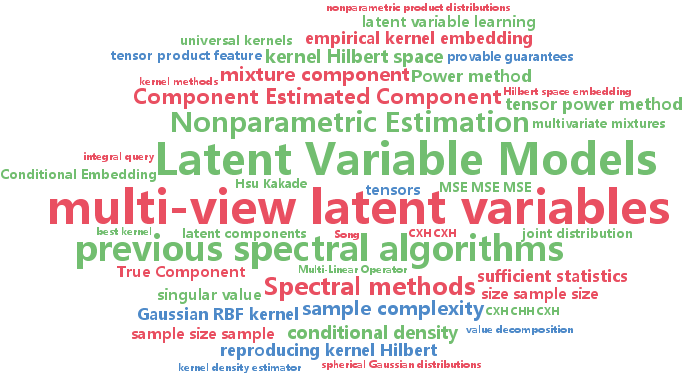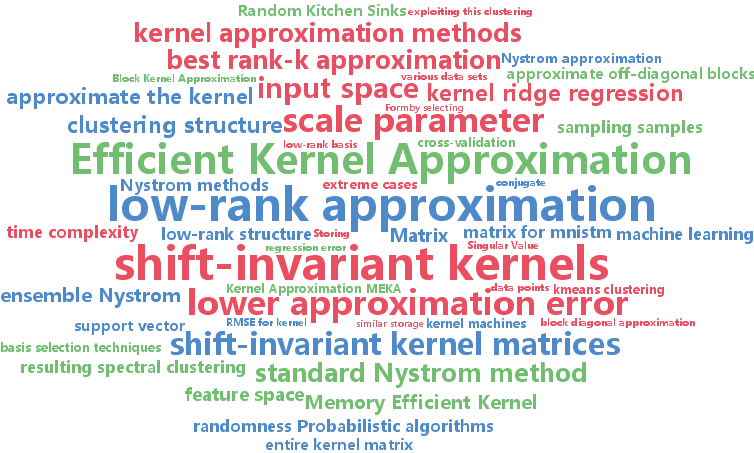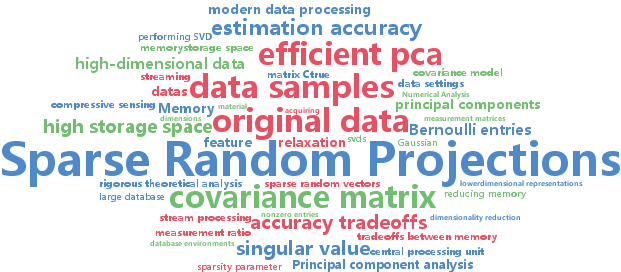singular value
-
Le Song and Animashree Anandkumar and Bo Dai and Bo Xie
Nonparametric Estimation of Multi-View Latent Variable Models (pdf)
Spectral methods have greatly advanced the estimation of latent variable models, generating a sequence of novel and efficient algorithms with strong theoretical guarantees. However, current spectral algorithms are largely restricted to mixtures of discrete or Gaussian distributions. In this paper, we propose a kernel method for learning multi-view latent variable models, allowing each mixture component to be nonparametric and learned from data in an unsupervised fashion. The key idea of our method is to embed the joint distribution of a multi-view latent variable model into a reproducing kernel Hilbert space, and then the latent parameters are recovered using a robust tensor power method. We establish that the sample complexity for the proposed method is quadratic in the number of latent components and is a low order polynomial in the other relevant parameters. Thus, our nonparametric tensor approach to learning latent variable models enjoys good sample and computational efficiencies. As a special case of our framework, we also obtain a first unsupervised conditional density estimator of the kind with provable guarantees. In both synthetic and real world datasets, the nonparametric tensor power method compares favorably to EM algorithm and other spectral algorithms.
-
Zheng Wang and Ming-Jun Lai and Zhaosong Lu and Wei Fan and Hasan Davulcu and Jieping Ye
Rank-One Matrix Pursuit for Matrix Completion (pdf)
Low rank matrix completion has been applied successfully in a wide range of machine learning applications, such as collaborative filtering, image inpainting and Microarray data imputation. However, many existing algorithms are not scalable to large-scale problems, as they involve computing singular value decomposition. In this paper, we present an efficient and scalable algorithm for matrix completion. The key idea is to extend the well-known orthogonal matching pursuit from the vector case to the matrix case. In each iteration, we pursue a rank-one matrix basis generated by the top singular vector pair of the current approximation residual and update the weights for all rank-one matrices obtained up to the current iteration. We further propose a novel weight updating rule to reduce the time and storage complexity, making the proposed algorithm scalable to large matrices. We establish the linear convergence of the proposed algorithm. The fast convergence is achieved due to the proposed construction of matrix bases and the estimation of the weights. We empirically evaluate the proposed algorithm on many real-world large scale datasets. Results show that our algorithm is much more efficient than state-of-the-art matrix completion algorithms while achieving similar or better prediction performance.
-
Si Si and Cho-Jui Hsieh and Inderjit Dhillon
Memory Efficient Kernel Approximation (pdf)
The scalability of kernel machines is a big challenge when facing millions of samples due to storage and computation issues for large kernel matrices, that are usually dense. Recently, many papers have suggested tackling this problem by using a low rank approximation of the kernel matrix. In this paper, we first make the observation that the structure of shift-invariant kernels changes from low-rank to block-diagonal (without any low-rank structure) when varying the scale parameter. Based on this observation, we propose a new kernel approximation algorithm -- Memory Efficient Kernel Approximation (MEKA), which considers both low-rank and clustering structure of the kernel matrix. We show that the resulting algorithm outperforms state-of-the-art low-rank kernel approximation methods in terms of speed, approximation error, and memory usage. As an example, on the MNIST2M dataset with two-million samples, our method takes 550 seconds on a single machine using less than 500 MBytes memory to achieve 0.2313 test RMSE for kernel ridge regression, while standard Nystr\{o
-
Farhad Pourkamali Anaraki and Shannon Hughes
Memory and Computation Efficient PCA via Very Sparse Random Projections (pdf)
Algorithms that can efficiently recover principal components in very high-dimensional, streaming, and/or distributed data settings have become an important topic in the literature. In this paper, we propose an approach to principal component estimation that utilizes projections onto very sparse random vectors with Bernoulli-generated nonzero entries. Indeed, our approach is simultaneously efficient in memory/storage space, efficient in computation, and produces accurate PC estimates, while also allowing for rigorous theoretical performance analysis. Moreover, one can tune the sparsity of the random vectors deliberately to achieve a desired point on the tradeoffs between memory, computation, and accuracy. We rigorously characterize these tradeoffs and provide statistical performance guarantees. In addition to these very sparse random vectors, our analysis also applies to more general random projections. We present experimental results demonstrating that this approach allows for simultaneously achieving a substantial reduction of the computational complexity and memory/storage space, with little loss in accuracy, particularly for very high-dimensional data.
-
Qian Zhao and Deyu Meng and Zongben Xu and Wangmeng Zuo and Lei Zhang
Robust Principal Component Analysis with Complex Noise (pdf)
The research on robust principal component analysis (RPCA) has been attracting much attention recently. The original RPCA model assumes sparse noise, and use the $L_1$-norm to characterize the error term. In practice, however, the noise is much more complex and it is not appropriate to simply use a certain $L_p$-norm for noise modeling. We propose a generative RPCA model under the Bayesian framework by modeling data noise as a mixture of Gaussians (MoG). The MoG is a universal approximator to continuous distributions and thus our model is able to fit a wide range of noises such as Laplacian, Gaussian, sparse noises and any combinations of them. A variational Bayes algorithm is presented to infer the posterior of the proposed model. All involved parameters can be recursively updated in closed form. The advantage of our method is demonstrated by extensive experiments on synthetic data, face modeling and background subtraction.




